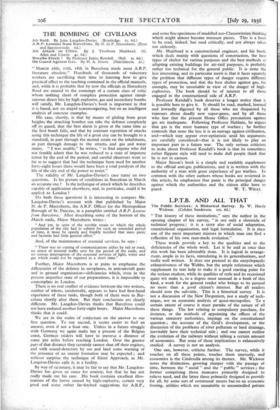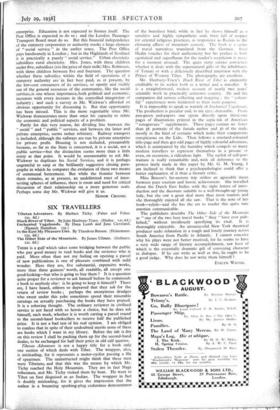L.P.T.B. AND ALL THAT
The Public Services.: A Historical Survey. By W. Hardy Wickwar. (Cobden Sanderson. Los. 6d.)
" THE history of these institutions," says the author in the opening chapter of his survey, " is not only a chronicle • of technical progress ; it is a story also of social adaptation, constitutional organisation, and legal formulation. It "is then one of the most important mirrors in which man can find a reflection of his own man-made evolution."
These words provide a key to the qualities and to the deficiencies of the whole work. Let it be said at once. that this work has been admirably done. It is logical in arrange- ment, ample in its facts, stimulating in its generalisations, and 'really well written. It does not pretend to the encyclopaedic exhaustiveness of the Webbs, but the ample references which supplement its text help to make it a good starting point for the serious student, while its qualities of style and its occasional quiet wit make it, to a degree most unusual in a book of this kind, a work for the general reader who brings to its perusal no more than a good citizen's interest. But all readers should note the sub-title. This is a historical survey. It is not a discussion of the New Despotism, nor a study of tech- nique, nor an economic analysis of quasi-monopolies. To a certain extent of course it must partake of the nature of all these things. The law relating to compulsory purchase, for instance, or the methods of appointing the -offices of the various statutory authorities, impinge on the constitutional question ; the account of the Grid's development, or the discussion of the problems of river pollution or land drainage, inevitably have their technical side ; and one cannot outline the evolution of the railways without talking a certain amount of economics. But none of these implications is exhaustively studied. A survey is not an analysis.
One can, however, criticise further. The survey, while it touches on all these points, touches them Unevenly, and economics is the Cinderella among its themes. Mr. Wickwar notes the distinction, growing sharper with the ..passage of time, between the " social " and the " public " services ; the former comprising those measures primarily designed to relieve need, and the latter those primarily designed to provide for all, by some sort of communal means but on an economic footing, utilities which are unsuitable to uncontrolled private
enterprise. Education is not expected to finance itself. The Post Office is expected to do SO ; and the London Passenger Transport Board must do so. But this financial independence of the statutory corporation or authority masks a large element of " social service " in the earlier sense. The Post Office pays handsomely in London ; but in the Highlands of Scotland it is practically a purely " social service." Urban electricity subsidises rural electricity. Mrs. Jones, with three children under five, subsidises (via the price of their milk) Mrs. Robinson, with three children between five and fourteen. The question whether these subsidies within the field of operations of a statutory authority are. in fact best paid, as at present, by the low-cost consumers of its services, or openly and visibly out of the general resources of the community, like the social services, is one whose importance, both political and economic, increases with every increase in the controlled- integration of industry ; and such a survey as Mr. Wickwar's afforded an obvious opportunity for discussing it. But that opportunity has been missed. This is the more regrettable since Mr. Wickwar demonstrates more than once his capacity to relate the economic and political aspects of a problem.
Partly for this very reason, his dividing line between the " social " and " public " .services, and between the latter and private enterprise, seems rather arbitrary. Railway transport is included, although the railways are run by private enterprise for private profit. Housing is not included, presumably because, so far as the State is concerned, it is a social, not a public service—but the distinction seems more than a little misty at that point. It would be unreasonable to ask Mr. Wickwar to duplicate his Social Services, and it is perhaps ungrateful to carp at the brilliantly suggestive closing para- graphs id which he compares the evolution of these two means of communal betterment. But while the frontier between them remains, as at present, an undelimited tract of inter- secting spheres of influence, there is room and need for critical discussion of their relationship on a more generous scale. Perhaps some day Mr. Wickwar will give it us.
HONOR CROOME.



































 Previous page
Previous page